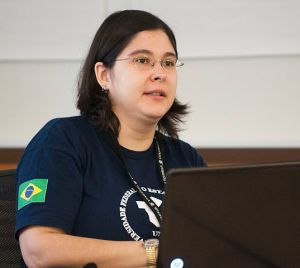By Professor Juliana Bastos Marques – UNIRIO (Federal University of Rio de Janeiro State, Brazil)
One late night in 2006, while I was struggling with my PhD thesis, I went looking for a quick reference for a Latin author in Portuguese Wikipedia, only to find out that there was nothing about him there (it was the Roman historian Ammianus Marcellinus). Indignant, I finally decided to register in order to write the new article myself. Soon I realized that was the tip of an iceberg: a lot of work was needed on other history-related topics, and I needed more help.

Wikipedian turned professor some years later, I thought it would be a good idea to recruit my students to write some good content and fix the disturbing mistakes we repeatedly found. Indeed, the state of the Portuguese Wikipedia, while counting more than 700,000 articles, is still usually written by non-specialists; this means several outdated theories and approaches, low-quality references and incomplete information. My other concern was quite practical: I needed to convince my own students that the additional information they used for my classes and exams was NOT to be looked for on Wikipedia, to avoid plagiarism for a start! In fact, all my friends who taught at primary and secondary schools also had the same problem: whether we want or not, Wikipedia is probably the most popular learning material in Brazil – and, in the current state, a bad one.
Serendipity came to my doorstep soon, when I first read an article about the Public Policy Initiative in Inside Higher Ed in September 2010, and later attended an event with Jessie Wild and Kul Wadhwa from Wikimedia Foundation on the following January, only to learn that WMF had plans for the expansion of the Global Education Program in Brazil. I also had the opportunity to attend the Wikipedia in Higher Education Summit, last July, in Boston. While I was only a spectator there, for my class would start in August, it was very exciting to see that other professors had already come to similar conclusions as to the value of Wikipedia for the university.
With the course taught, mistakes made and also success achieved, I have some input to share on my experience. First of all, I’d have in mind that the goal of using Wikipedia in class is ultimately to improve weak articles. This works perfectly for the case of the Portuguese Wikipedia, and certainly with dozens of other languages. In the case of more developed Wikipedias such as the English one, I believe this means a careful selection of potential new or stub articles to work with.
The course I taught improved substantially a set of articles related to Roman History, but it was peculiar in the sense that it was an elective course with 25 students. They had a combination of traditional lectures with work in the lab, always with the aid of a Campus Ambassador (who happened not to be a student, but a very proficient and participating member of the Portuguese Wikimedia community), two also very proficient Online Ambassadors and a dedicated mailing list. All students worked in their sandboxes until I graded and revised the content, and the Ambassadors approved the technical Wikipedia format, code and writing. This was crucial in preventing early deletions and distrust from the community, which would certainly discourage the students. Also, I decided to engage the Portuguese-speaking Wikipedia community early on, mostly through the Wikimedia Brasil mailing list, in order to make them aware of what we were planning. The members were very supportive and eventually helped the students in their discussion pages, teaching them to avoid plagiarism and to write with neutrality.
In due time, I realized I should not be concerned whether I was creating a new set of editors, which I believe to be a somehow misleading goal. All Wikipedia editors are volunteers, and their will to contribute will always be beyond a class, a grade or our encouragement as teachers. However, I feel we have created multipliers: even if they never edit again, my students will eventually teach on their own, and they will tell their students about how knowledge is never ready and finished, is never to be trusted without critical reflection, and can be improved through their own learning and work.
The students very soon learned that the set of skills they needed to practice was somehow different from what it was expected in academia. After all, writing for encyclopedias requires strict objectivity, impartiality and anonymity, so that the voice of the writer is not to be distinguished. However, together with other skills such as knowing when and how to use references correctly, or learning how to distinguish and explain different points of view regarding a subject, these abilities helped them understand the subject and their own learning results in a much more clear and precise way than before. For instance, I had to go with them phrase per phrase sometimes, until they could really master what they meant to say – a careful dynamic that all professors know is impossible to follow when grading a pile of papers.
Last but not least, the students ultimately learned that an encyclopedia is a starting point. And it was their own work that could make it a solid starting point for both themselves and any other reader. For the next semester, starting here in Brazil in February, I will continue using the opportunity that Wikipedia gives for professors and students to teach, to learn and to work with quality and rigor, while sharing our knowledge from the often closed corridors of academia to the entire world. I’d easily say that this has been to me the biggest reward of using Wikipedia for teaching.

Can you help us translate this article?
In order for this article to reach as many people as possible we would like your help. Can you translate this article to get the message out?
Start translation